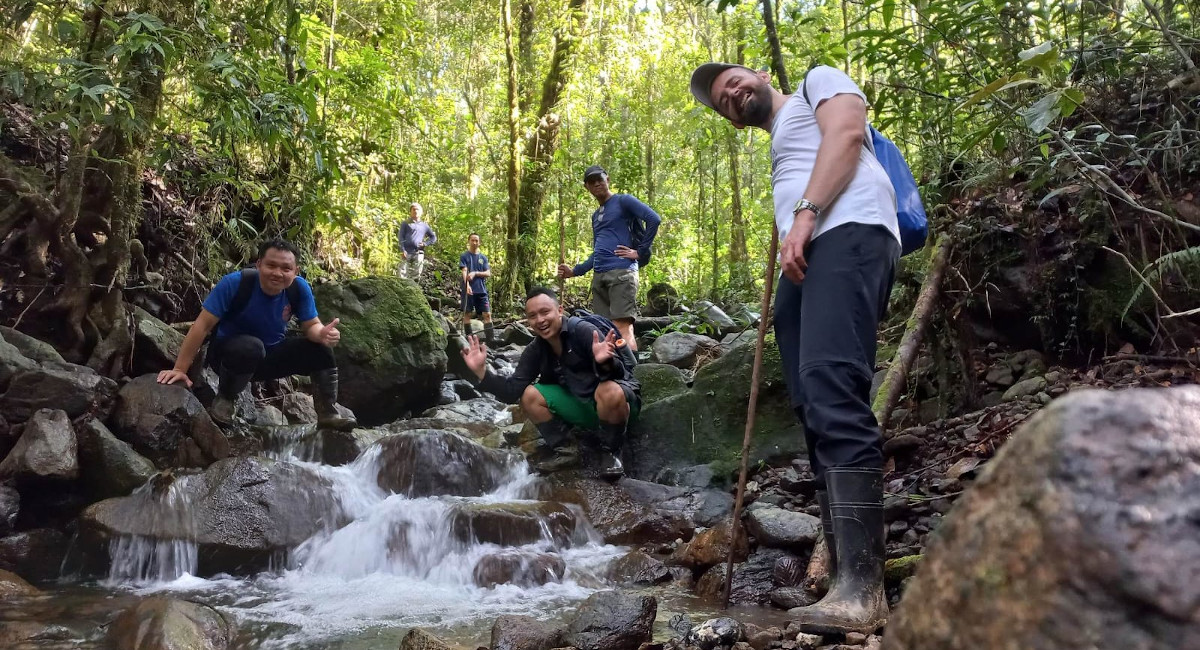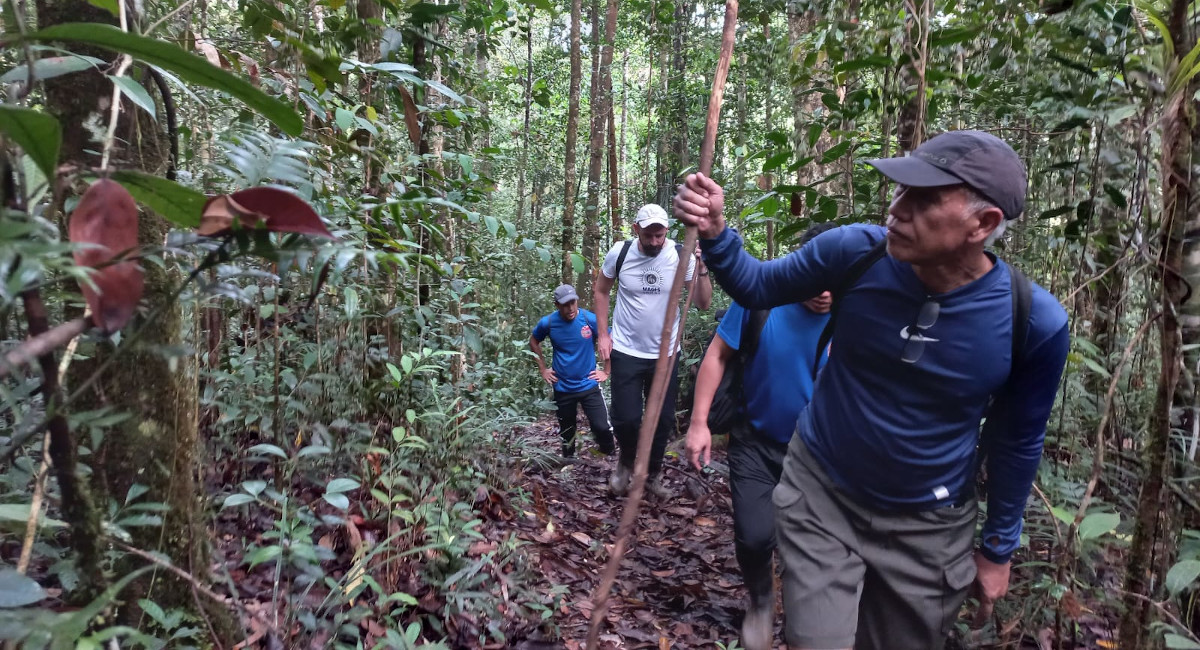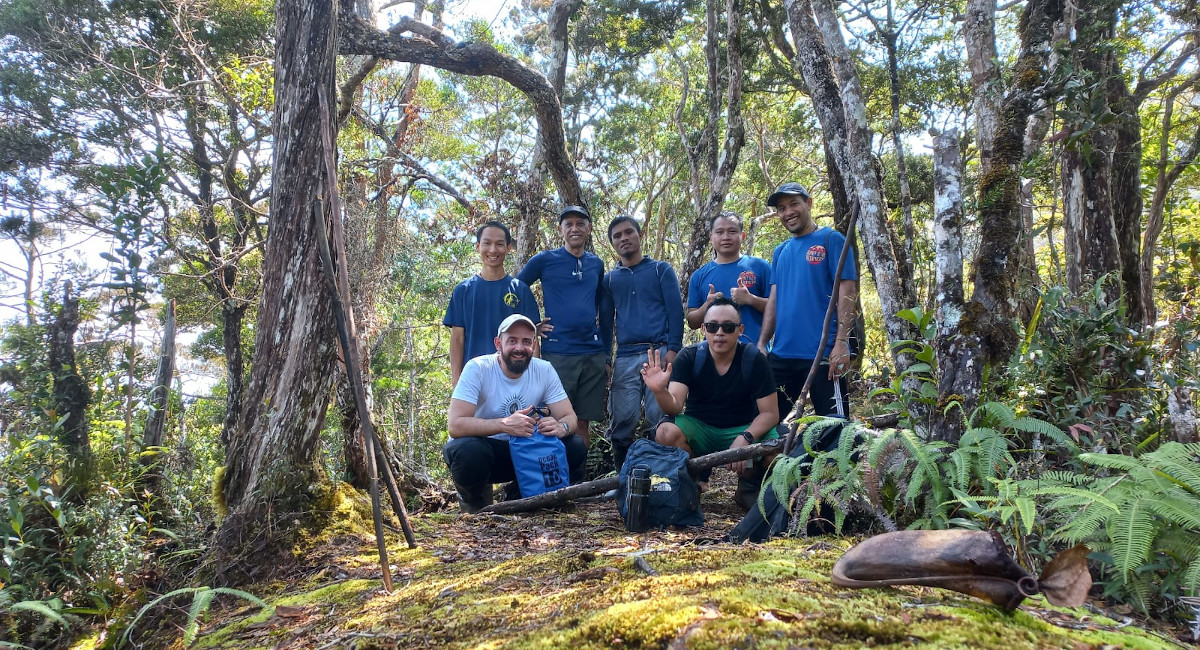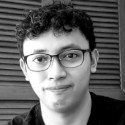 On 6 June, we finally arrived in Bendum after a challenging journey that involved a two-day boat ride from Manila, a half-day transit in Cebu, an overnight stay in Cagayan de Oro, and a six-hour land transport. Our group consisted of five scholastics from Arrupe International Residence in Quezon City, and our Rector, Fr Riyo Mursanto SJ.
On 6 June, we finally arrived in Bendum after a challenging journey that involved a two-day boat ride from Manila, a half-day transit in Cebu, an overnight stay in Cagayan de Oro, and a six-hour land transport. Our group consisted of five scholastics from Arrupe International Residence in Quezon City, and our Rector, Fr Riyo Mursanto SJ.
Bendum is an area that holds immense value. Part of Bukidnon Province, it contains the headwaters of Mindanao’s four major rivers and is a significant source of water. One-third of the island’s population depends on the water resources derived from Bukidnon for agriculture, domestic use, hydropower, and industry. Unfortunately, like many other regions in Southeast Asia, Bendum has undergone significant deforestation, resulting in environmental degradation.
We visited Fr Pedro Walpole SJ and the indigenous community that has been involved in assisting the natural regeneration of the forest area in Bendum for more than three decades. During our one-week stay, we had the opportunity to walk with Fr Pedro, who guided us through our adventure in Bendum.
We made our way to the forest that was once a vast corn farm a decade ago. Migrants had deforested the land for agriculture. As we walked through the area, Fr Pedro explained that after some years of farming, the land became difficult to cultivate, requiring larger quantities of fertilisers, yet the yields failed to meet the market demand. Faced with this difficulty, the migrants eventually abandoned the land and moved to other areas, where they established new farming fields.
Fr Pedro and the community are determined to restore the forest, recognising its crucial role in securing a reliable water source. As part of this effort, they conduct meticulous land mapping, identify all the native species in the area, and vigorously promote sustainable forest management practices through natural regeneration. Walking with Fr Pedro provided me with hope and new perspectives on the importance of caring for the earth. After 10 years of dedicated efforts towards natural regeneration, we saw lush green forests, with many different trees, including pillar species, and stronger, cleaner water streams. Their dedication has inspired me to reflect more deeply on how I can simplify my lifestyle to partake in this effort.
 The following day, we went for a half-day hike with Jason, a member of the local community in Bendum. Deep into the jungle, we were embraced by a serene silence, with only the songs of the birds, the rustling of the wind through the trees, the falling of leaves, and the buzzing of insects breaking the stillness of the forest. After hiking for almost two hours, we found pitcher plants on a hill. It brought back childhood memories of reading about them in encyclopaedias. Growing in nutrient-poor soil, they survive by luring insects for food.
The following day, we went for a half-day hike with Jason, a member of the local community in Bendum. Deep into the jungle, we were embraced by a serene silence, with only the songs of the birds, the rustling of the wind through the trees, the falling of leaves, and the buzzing of insects breaking the stillness of the forest. After hiking for almost two hours, we found pitcher plants on a hill. It brought back childhood memories of reading about them in encyclopaedias. Growing in nutrient-poor soil, they survive by luring insects for food.
But, wait, doesn’t the forest’s apparent abundance indicate fertile land? “It’s not uncommon for outsiders like us to make that assumption,” commented Fr Pedro. Indeed, in the past, migrants turned the forest into farming fields based on such assumptions. It was only after several years of cultivating the land that they began to grasp the truth–that fruitful harvests required the use of fertilisers. However the high production costs associated with this kind of agricultural practice discouraged the farmers, ultimately leading them to abandon the area.
This realisation highlights the importance of not only taking concrete action to assist natural regeneration, but also prioritising culture-based education. Fr Pedro, Jason, and the community have established a local school to help children develop a better understanding of their surroundings and nature. I was amazed to learn that the students helped Fr Pedro map the ancestral land of Bendum. They identified the pillar species, nursed their seeds, counted every single tree in the jungle, put them on the map, classified the grasses for cutting or preservation, and so on and so forth.
Living in the simplicity of Bendum exceeded my expectations. There was no internet or cell phone signal, but we had solar power cells that gave us electricity, fresh air, good food, breath-taking views, and restful sleep. What a life I had been yearning for since staying in busy cities like Jakarta and Manila in my formation as a Jesuit.
After having dinner at about 7 o’clock, it felt as if it were already midnight. Sleeping early was not a good idea, as it would result in waking up in the middle of the night. We were a diverse group: Vien from Vietnam, Mate from Croatia, Dickson from Micronesia, Justin from Myanmar, and Fr Riyo, and myself from Indonesia. One might think we would get bored or frustrated, but that was far from the truth. We spent our nights sharing stories, laughing heartily about our day’s activities, especially our cooking time, engaging in conversations about our country’s history, and feeling a true sense of being with others.

I learned a lot about the difficult situation in Myanmar and discovered similarities between Micronesia and Indonesia. To a certain extent, I understood how it feels to live under a communist regime like Vietnam, and noted many good stories from the small yet vibrant country of Croatia.
On the other hand, there were moments when I felt challenged by the “local wisdom” of my friends’ cultures. It reminded me of intercultural encounters discussed in my textbooks.
Fr General Arturo Sosa emphasises the increasing significance of developing intercultural capacity in today’s world. Interculturality goes beyond ethnocentrism and is distinct from multiculturalism/internationalism, which focuses on promoting tolerance in diverse settings. It also differs from cross-culture, which prioritises assimilation or accommodation to a dominant culture.
In Fr Nicolas Standaert’s framework, fostering intercultural community includes a progression from “care about” to “caring for one another” and then to “learning-accepting challenges from each other,” while engaging in dialogue and connecting histories.
My time in Bendum allowed me to experience interculturality wholeheartedly. I can’t help but wonder how we managed to engage in hours-long conversations, despite our differences in culture, age, and perspectives. What is it about the joy of being connected with nature that captivates us so deeply?
I will forever be grateful to Bendum for helping me realise that the world of the internet is not everything in life. While we certainly benefit a lot from it, as a Gen Z, I learned that living with other people and spending less time in front of the screen gives me many chances to experience genuine connections with nature and friends. Thank you, Bendum! Now I know where I belong.
 Adi Bangkit is an Indonesian Jesuit studying theology at the Loyola School of Theology in Manila, Philippines. He is passionate about intercultural education and Ignatian innovation. Adi can be reached at adibangkit@jesuits.net.
Adi Bangkit is an Indonesian Jesuit studying theology at the Loyola School of Theology in Manila, Philippines. He is passionate about intercultural education and Ignatian innovation. Adi can be reached at adibangkit@jesuits.net.

